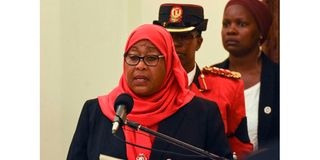Tanzania female judges launch bench book on women rights

Tanzania President Samia Suluhu Hassan. While launching the bench book, she encouraged stakeholders to ensure the principles outlined in the publication are put into practice.
What you need to know:
- Tanzania Women Judges Association and UN Women have produced the country’s first gender bench book on women’s rights.
- Book will serve as a vital tool to protect women’s rights, opportunities and participation in the delivery of justice services in Tanzania.
The Tanzania Women Judges Association (TAWJA) and UN Women have produced the country’s first gender bench book on women’s rights.
The UN body, in a press statement, said the book will provide an accessible and user-friendly reference guide for judicial officers in protecting the rights of women and girls.
This includes strengthening the gender-responsiveness of judgments on cases, and ensuring women and girls are treated with the dignity and respect they deserve.
Gender-based violence (GBV) remains one of the greatest challenges facing women and girls in Tanzania.
According to government data, 41,000 cases of violence against women were reported in 2017 alone, with discriminatory customs and traditions still presenting significant barriers to the realisation of gender equality.
Court system
The book was developed through the support from the government of Sweden to the UN Women’s Access to Justice, in partnership with TAWJA, to strengthen the court system in the management of cases of violence against women.
UN Women Representative Hodan Addou while speaking during the launch said it will serve as a vital tool to protect women’s rights, opportunities and participation in the delivery of justice services in Tanzania.
“It will assist judges, lawyers, and human rights defenders with quick reference materials on applicable laws, decided cases and innovative victim-friendly court procedures on the cases that women bring to court,” she added.
TAWJA Chair Justice Joacquine De Mello, said the book would lead to proper judicial discretion and decision-making, use of local and international best practices, and equip judicial officers with skills to identify discriminatory laws and practices.
Gender biases
“The bench book will, therefore, serve as a catalyst in changing gender biases and attitudes, strengthening capacities of justice actors to administer justice in such a way that safeguards the rights of women,” she said.
Tanzania President Samia Suluhu Hassan, who officially launched the book emphasized its role in nurturing positive gender attitudes and enabling judicial officers to deliver justice based on existing laws that protect women and girls.
President Suluhu called on judicial officers at a high court that was recently designated to handle family-related cases including marriage, divorce, inheritance, sexual harassment and abuse, to make good use of the guidelines.
She urged the judiciary and Ministry of Justice and Constitutional Affairs to disseminate it to other key actors, such as the police force.
Women's rights
She encouraged stakeholders, including civil society and women’s rights organizations in the country to ensure the principles outlined in the book are put into practice.
“Success cannot come from court rulings alone, but from the way communities will change and respect the dignity of women without any bias. By working together, your collective voices will effect the change we need for the sustainable development of the country,” said President Suluhu.




